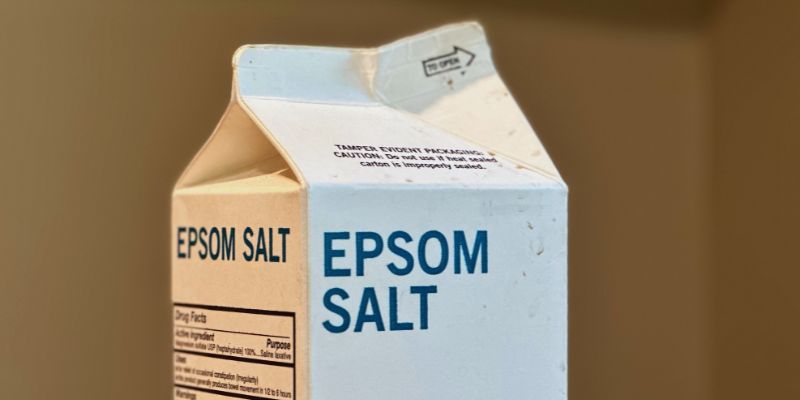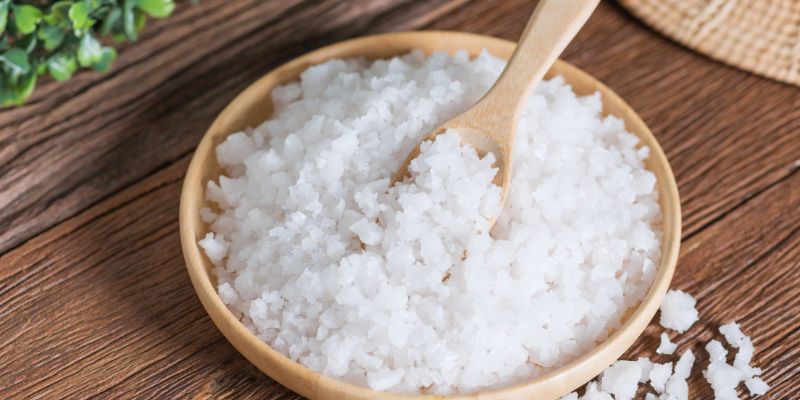Epsom Salt for Acne: Uses, Benefits, Risks, and All You Need To Know
Advertisement
Dealing with acne can be annoying, particularly in cases when conventional therapies seem to fail. Many people increasingly seek natural cures, and Epsom salt is one of the most often used. Epsom salt, well-known for reducing inflammation and muscular pain, is also thought to help with skin health.
Epsom salt could provide a mild, comforting remedy whether your problems are with sporadic outbreaks or chronic acne. But how does it help with acne, and are there hazards involved? This guide will look at the uses, benefits, and possible drawbacks of Epsom salt applied to acne so you may decide whether it fits your skincare routine.

What is Epsom Salt?
Magnesium, sulfur, and oxygen naturally occur in Epsom salt. Unlike ordinary table salt, it is meant for therapeutic usage rather than for eating. When added to a warm bath, it is most often known for helping to reduce tension and muscle aches. Because the salt melts readily in water, the body can absorb its helpful minerals through the skin. A key element of Epsom salt, magnesium helps to lower inflammation and encourage relaxation. Conversely, sulfur is well-known for enhancing skin conditions and helping the body to detoxify itself.
From calming bath soaks to topical application in face masks or scrubs, Epsom salt can be used in many different ways. Many people seeking holistic approaches to ease discomfort, lower swelling, and even encourage better skin choose it because of its adaptability and natural qualities. One cheap, readily available treatment with many advantages for the body and the skin is Epsom salt.
How Does Epsom Salt Help with Acne?
Acne results when dead skin cells, debris, and oil clog hair follicles. Often, this results in blackheads, pimples, and various kinds of blebs. Epsom salt is thought to be helpful in the following respects for acne:
- Anti-Inflammatory Properties: Epsom salt is well-known for lowering inflammation and calming agitated skin. Regular usage of Epsom salt may help to minimize swelling and redness sometimes brought on by acne.
- Exfoliation: Epsom salt, when used as a scrub, aids in the removal of dead skin cells. Clearing blocked pores helps avoid fresh breakouts and improves skin tone.
- Absorbing Excess Oil: Epsom salt can help the skin absorb extra oil, a main factor aggravating acne. It could help to maintain more balanced and less greasy skin.
- Promoting Healing: The magnesium in Epsom salt is supposed to help with skin healing by lowering inflammation and encouraging cell renewal. Regular use can help acne scars fade, smoothing and clearing the skin over time. It will assist the general texture of the skin.
How to Use Epsom Salt for Acne?
Epsom salt can be included in your skincare routine in several ways. Here are some typical approaches:
Epsom Salt Facial Steam
- Boil the water, then stir in one teaspoon of Epsom salt.
- Position your face over the steam (maintain a reasonable distance to prevent burns).
- Towels help you capture the steam by covering your head.
- Spend five to ten minutes allowing the steam to open your pores and the salt to wash your skin.
Epsom Salt Face Mask
- Toss Epsom salt with a few drops of water or honey to create a paste.
- Concentrating on acne-affected areas, apply the paste on your face.
- Let it sit for ten to fifteen minutes, then rinse with warm water.
Epsom Salt Scrub
- Combine Epsom salt with an olive or coconut oil carrier oil.
- Use the mixture to clean your body or face softly.
- Rinse under warm water. It exfoliates and gets dead skin cells off of you.
Epsom Salt Bath
- To a warm bath, add one cup of Epsom salt.
- Soak for fifteen to twenty minutes at most. It can calm the skin and lower irritation.

Benefits of Epsom Salt for Acne
Epsom salt provides various advantages for skin prone to acne:
- Reduces Redness and Swelling: Redness and swelling brought on by acne can be subdued with anti-inflammatory qualities. This calming effect makes the skin look less irritated and more balanced.
- Cleanses Pores: Epsom salt's exfoliating and oil-absorbing qualities help keep pores free from clogs and clear. By preventing buildup, it reduces the chances of future breakouts.
- Improves Skin Texture: Regular Epsom salt application can help smooth rough skin and lessen the appearance of acne scars. Over time, it can leave the skin feeling softer and looking more even.
- Relieves Stress: Stress can intensify acne; hence, the magnesium in Epsom salt might assist in lowering stress, indirectly improving your skin. Relaxing with an Epsom salt bath also enhances overall health, which reflects positively on the skin.
Risks of Using Epsom Salt for Acne
Although Epsom salt can help with acne, there are several concerns to take into account:
- Skin Irritation: Some people can be sensitive to Epsom salt, which might cause dryness or irritation. Test a little bit on your skin first before applying it extensively.
- Over-Exfoliation: Epsom salt should not be used too often since over-exfoliation might result from it, and dry, irritated skin could follow. One should avoid overdoing it.
- Not a Cure for Severe Acne: Epsom salt might help control mild to moderate acne, but it is not a sure fix. See a dermatologist for more focused therapy on severe acne.
- Dryness: Epsom salt helps the skin absorb moisture; hence, it's important to hydrate following application to avoid dryness.
Conclusion:
Using Epsom salt in your skincare routine might help with acne management. Its exfoliating and anti-inflammatory qualities assist in clearing pores, lower redness, and encourage healing. Its magnesium concentration can also help to reduce tension, indirectly enhancing skin condition. But, if you have sensitive skin, you should apply it carefully to prevent over-exfoliation or irritation. Epsom salt is not a replacement for expert therapy, even if it can help control mild to moderate acne. See a dermatologist for serious acne or ongoing problems. Epsom salt can help to support better, more radiant skin with careful application.
Advertisement












